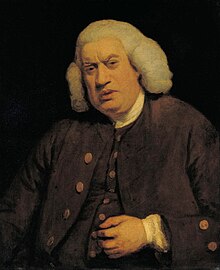 |
| Dr Johnson, by Joshua Reynolds (Reynolds was no stranger to club life either) |
Others got a little more specific. A 19th century antiquarian wrote:
“The word club… claims a descent from the anglo saxon ... it is derived from cleofan, 'to divide,' because the expenses are divided into shares of portions – uniting to divide, like ‘cleave’...”
Enough with these prententious etymologies. What I really want to know is why these men consistently showed up week after week to the same London tavern for dinner? Why did they care? What did they talk about? How did being "clubbable" (in Johnson's words) shape their identities?
The "Wednesday's Club," which I brought up last time, didn't have quite the same social caché as the Thursday's Club. Or at least it didn't start out this way. On the attendance record for its first year of existence, which you can see below, there are no titled men.
 |
| Yearly attendance record from the first year of the club in 1687. Every week you showed up you would get a 'mark' in the book. |
How are we to learn more about these people? It isn't easy; the records don't indicate the professions of new members until the 1760s. Once that happened, I encountered a wide range of occupations: lawyers, doctors, men working in municipal government ... even a few London mayors. There were also silversmiths, whalebone merchants, refiners, and print-sellers. The list goes on and on.
But because many of these men were more or less 'nobodies' compared to the uber-connected R.S. fellows, it is harder to learn about their private lives: their interests, their anxieties, their relationships. Their names consistently appear on the attendance records each week, but the lives of these men remain for now a mystery.
Can the club rules tell us anything about these men? One rule struck me as rather peculiar:
“Item: that if any member of this Club shall marry a wife or baptize any child or children, that such member shall on the next club night he shall appear expend upon the members of the club then present as a treat upon the account of such marriage or christening halfe a crowne, and if he shall neglect to discover the same within one month, to forfeit over and above the said charge 6d."
When we compare a rule like this to today's etiquette, it seems totally bizarre. Shouldn't this be the other way around? Aren't you supposed to receive gifts when you get married or have a kid? And this rule wasn't exactly optional. If you didn't fess up to your good fortune, you would incur additional fines.
What was the Wednesday's Club thinking when these lines were written in the rule book? For the rule suggests that the club saw itself as something more than a mere escape or diversion from the toils of the everyday. It doesn't ask but demands to be informed of your intimate private life.
The people with whom we choose to associate –– who we work with, who we sleep with –– always end up saying something about who we are, and how we'd like others to see us.
But what about who we eat with?
What was the Wednesday's Club thinking when these lines were written in the rule book? For the rule suggests that the club saw itself as something more than a mere escape or diversion from the toils of the everyday. It doesn't ask but demands to be informed of your intimate private life.
The people with whom we choose to associate –– who we work with, who we sleep with –– always end up saying something about who we are, and how we'd like others to see us.
But what about who we eat with?
Check out the reference to Fernand Braudel, The Structures of Everyday Life here. Could help you with your research.
ReplyDeletehttp://www.thefreemanonline.org/columns/thoughts-on-freedom-so-much-to-read/